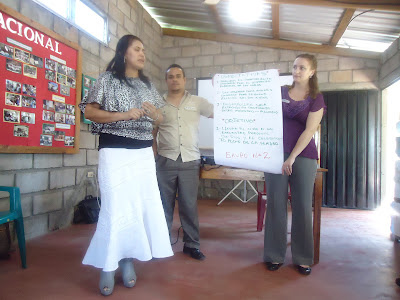So it seems Honduras has a special place in
Henry´s heart considering he takes advantage of about every opportunity to come
and visit! In the past he has led 3 work
teams for water projects and housing construction following Hurricane
Mitch. Last year he and his wife, Susan,
trekked all over rural Honduras evaluating previous water projects. This time Henry left Susan in Edmonton
(although I´m sure she would have loved to come too) but brought along Don
& Eleanor Prokuda from the board of the Northern Alberta Deaconal Conference
(NADC). NADC coordinates the funding and
promotion of the annual Honduras Water Project with the King´s University and
over 30 supporting churches throughout Alberta.

I was especially excited to join Henry in
his 3-day visit to La Avispa. My home
church of Inglewood CRC is considering a long-term partnership with a community
in Honduras and as Henry is on the coordinating committee he opted to check out
La Avispa as one of the possibilities suggested by CRWRC. Along with the Prokudas, Ana Joya from CRWRC
Honduras, and Arturo from Diaconía, we explored the various neighbourhoods of
La Avispa in order to get to know the people of this remote village. We held meetings with members of the
Christian Reformed Church to discern their spiritual strengths and aspirations and
the next day with all the leaders in the community regarding the physical needs
and ongoing projects in La Avispa. We
were very well received and the people of La Avispa were eager to share their
history especially in the aftermath of Hurricane Mitch and again in 2008 with a
severe landslide.

On March 2nd we all traveled to
El Chapernal to celebrate the inauguration of the recently completed water
project. The whole community put a lot
of effort in to the decorations, program and fest afterwards. The
community leaders took turns presenting certificates of recognition for each of
the projects contributors including Diaconía Nacional, CRWRC, NADC, the King´s
University, the mayor of San Francisco de la Paz, the National Water and
Sanitation Department (SANAA), among others.
The school children also
contributed to the festivities by performing folk dances and dramas.

The ceremony was concluded with an elderly
woman from the village filling a clay jar from the newly installed tap, placing
the jar on her head and smashing it on the ground. This is a tradition for water project
inaugurations and symbolizes the hard work that women endure hauling water to
their houses and that never again will they have to place a jug on their head
since the water project has been successfully completed. I can hardly imagine having to carry water on
my head – even worse to go uphill or in the mud and rain or under a scorching
sun! But to think that this elderly
woman from El Chapernal must have done just that her whole life and only
recently received running water in her house.


All in all, I think Henry, Don and Eleanor all
had a great time in La Avispa, El Chapernal and in Honduras in general. We met a lot of great people, heard some
amazing stories and shared delicious meals together. I´ve come to realize that Hondurans are a
noble, hardworking and hospitable people.
The people of Chapernal were incredibly gracious and appreciative in their
thanks to God for the tremendous gift of clean, cool water. And the people of La Avispa were generous,
sincere and excited to know more about their brothers and sisters in Christ at
Inglewood CRC. It is always a privilege
for me to share in these experiences; it reminds me of why God placed the
desire to volunteer in my heart.
 |
Henry Bosch followed by Eleanor and Don Prokuda
taking in the sights of La Avispa |
P.S. I am also thankful for good health during
and after Henry´s visit. The last time
he came I ended up in the hospital minus one appendix!



















